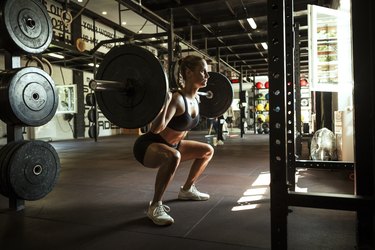
Some aspects of building strength are relatively straightforward: Your muscles need strength training, protein and recovery. Hormones — unfortunately — aren't quite so simple. Every body responds a little differently to exercise, which makes researching and understanding human growth hormone (HGH) release difficult.
While exercise can trigger HGH release, the time you spend asleep is just as important as the time you spend in the gym. Before you prioritize a high-intensity gym routine, take a look at your sleep schedule for optimal human growth hormone production.
Video of the Day
Video of the Day
Read more: Is This Hormone a Health Miracle or Mistake?
Exercise and Human Growth Hormone
HGH is the primary hormone your body uses for growth and cell reproduction. Levels are highest during childhood, reaching a peak during puberty, and generally decline after middle age, according to Harvard Health Publishing.
However, there are natural ways to promote HGH production — like exercise. Exercise is among the most powerful stimulants for HGH production and can also promote better sleep, which is when your body releases the hormone most.
Specifically, heavy resistance exercise has been shown to increase growth hormone in both men and women, according to a small June 2015 study published in Growth Hormone & IGF Research. After performing heavy back squats, both men and women showed an increase in HGH levels. Interestingly, women experienced a higher increase in hormone levels than men. Researchers speculated that this may be due to differences in sex hormones (ex. testosterone, estrogen and progesterone).
Exercise Intensity Matters — to a Degree
That doesn't mean that you should spend your entire workout at the squat rack, though. In a 2019 study published in the Journal of Strength and Conditioning Research, participants performed three different types of squat variations. The athletes did experience an increase in HGH, but levels didn't vary as they moved from exercise to exercise.
The endocrine system, responsible for triggering hormone release, responds to the intensity or volume of your workout, not the specific exercises (although the two may sometimes be related), according to a 2015 article published in Molecular and Cellular Regulation of Adaptation to Exercise.
In other words, the more intense your workout, the more likely it is to trigger a hormonal response. But there's an upper limit, as the body eventually adapts to exercise over time, according to the article. Plus, consistently training at a high intensity or volume can overload your endocrine system.
Although many forms of exercise can stimulate hormone release, more HGH doesn't necessarily mean more muscle or strength. You still need to send your body "muscle-building signals" through resistance training for hypertrophy, according to the National Academy of Sports Medicine. This means you need to create a strength-training program that involves a gradual increase in resistance or weight over time.
Sleeping Also Promotes HGH Release
Alongside exercise, sleep is the other most powerful stimulus for HGH secretion. Some even call sleep the natural "athlete's steroid," as it's one of the most effective keys to human growth hormone release, according to the Health and Fitness Association. The body begins to release HGH during the deepest stages of slow-wave sleep.
If you're looking to build strength and muscle, improving your sleep can be a game changer. Stick to a consistent sleep schedule, practice a relaxing bedtime ritual and limit light exposure before bed, according to the National Sleep Foundation.
And drinking alcohol can not only inhibit exercise-induced muscle growth, according to a January 2017 study published in the Journal of Strength and Conditioning Research, but it can also negatively affect your sleep. Cigarettes are stimulants (like caffeine) and can also make it harder to fall and stay asleep.
Exercise and sleep work together in a cycle to help you get the most out of your body's HGH production. While exercise can help trigger production of human growth hormone, it can also improve your quality of sleep, according to the National Sleep Foundation. As you sleep, you release more HGH, promoting muscle recovery for the next day of training, and so the cycle continues.
- Harvard Health Publishing: "Growth hormone, athletic performance, and aging"
- Growth Hormone & IGF Research: "Acute resistance exercise stimulates sex-specific dimeric immunoreactive growth hormone responses"
- Molecular and Cellular Regulation of Adaptation to Exercise: "Effect of Three Different Maximal Concentric Velocity Squat Protocols on MAPK Phosphorylation and Endocrine Responses"
- National Academy of Sports Medicine: "Back to the Basics: Hypertrophy"
- Health and Fitness Association: "Sleep: The Athlete’s Steroid"
- National Sleep Foundation: "Healthy Sleeping Tips"
- Journal of Strength and Conditioning Research: "Effect of Acute Alcohol Ingestion on Resistance Exercise–Induced mTORC1 Signaling in Human Muscle"
Is this an emergency? If you are experiencing serious medical symptoms, please see the National Library of Medicine’s list of signs you need emergency medical attention or call 911.